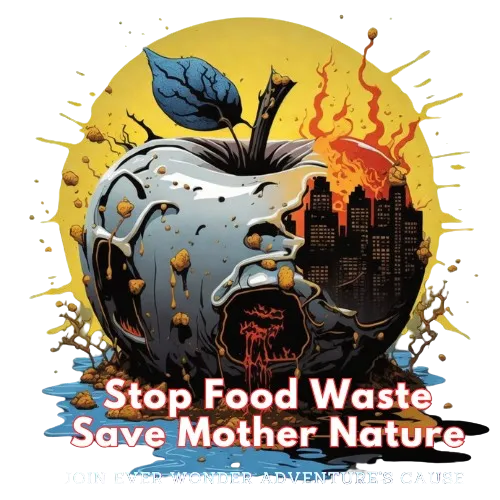🌍 The Imminent Catastrophe: A Harrowing Wake-Up Call
Introduction:
In a world besieged by crises, there is one silent calamity quietly edging closer to the precipice—a mounting heap of food waste. It is not merely a matter of eco-consciousness; it is an imminent peril that threatens our environment, intensifies climate change, and forces millions into the abyss of hunger.
🌊 A World in Turmoil: The Harbingers of Doom
Visualize this alarming reality: Annually, a staggering one-third of all food crafted for human sustenance, valued at a staggering
USD$1 trillion, faces a dire fate—it is recklessly discarded. This translates into an astonishing 1.3 billion tons of food, a cornucopia of nourishment capable of feeding an astounding 3 billion people. However, the repercussions of this colossal squandering stretch far beyond mere figures; they entail excessive water use, tallying up to USD$172 billion, and the expulsion of an alarming 4.4 gigatonnes of greenhouse gases every year. This ominous discharge catapults food waste into the disheartening position of the third-largest contributor to global greenhouse gas emissions, trailing only behind China and the United States.
🌦️A Glimmer of Hope: The Rise of Food Heroes
Amidst this disheartening narrative, a beacon of hope remains. Every individual can ascend as a "food hero" by taking resolute actions to combat food waste across the entire supply chain—from production to consumption and waste management. Here are the pivotal 15 steps as recommended by Food and Agriculture Organisation of the United Nations :
Adopt a Healthier, More Sustainable Diet 🍏
Buy Only What You Need 🛒
Pick 'Ugly' Fruits and Vegetables 🍎
Store Food Wisely 🍞
Understand Food Labelling 🗂️
Start Small 🥄
Love Your Leftovers 🍲
Put Your Food Waste to Use 🌱
Respect Food 🌾
Support Local Food Producers 🌽
Keep Fish Populations Afloat 🐟
Use Less Water 💧
Keep Our Soils and Water Clean 🌱💧
Eat More Pulses and Veggies 🥦🌱
Sharing Is Caring 🤝
🌪️ The Gathering Storm: Greenhouse Gas Emissions
But why must this mission to curb food waste seize our immediate attention? Because the greenhouse gas emissions arising from the decomposition of food waste and the entire food production value chain are far from benign. These emissions serve as a potent driver of global warming, propelling our planet perilously close to breaching the 1.5-degree Celsius threshold outlined in the 2015 Paris Accord. The primary antagonist is methane—a greenhouse gas even mightier than carbon dioxide. When food waste decomposes, it generates methane, which persists in our atmosphere, acting as a malevolent heat trapper that intensifies the greenhouse effect. Over a century, one tonne of methane bestows 28 times more warming than a tonne of CO2.
🌋The Fury of Nature: An Ominous Prelude
Now, let's connect the dots between our actions—or inaction—and the relentless surge of global warming and climate change. The recent flash floods that engulfed Libya and New York, leaving a trail of destruction in their wake, and the unbridled inferno that devoured parts of Hawaii—these events are not mere coincidence; they are early harbingers of the dire consequences of our collective indifference to the ramifications of global warming and climate change. They underscore the profound impacts on weather patterns, temperature surges, and air quality.
🌎 The Cry of Desperation: The Imperative of Goal 12.3 of UN Sustainable Development Goals
We find ourselves at a pivotal juncture, poised delicately between impending catastrophe and potential salvation. The challenge set forth by the 2015 Paris Accord is clear: we must strive to confine global warming to a mere 1.5 degrees Celsius above the pre-industrial era's benchmarks. Yet, the sands of time are slipping away, and we stand precariously close to breaching this critical threshold. The repercussions of such a breach resonate profoundly, impacting not only our ecosystems and economies but also the very fabric of human existence. Recent calamities, far from isolated occurrences, are but stark elements interwoven into the overarching narrative of climate upheaval.
At the heart of our endeavours lies 🎯Goal 12.3 of the UN Sustainable Development Goals. This goal, while distinct from the 2015 Paris Accord, carries a weighty significance of its own. It calls upon us to achieve a pivotal objective by 2030: the halving of per capita global food waste at both the retail and consumer levels, accompanied by a concerted reduction of food losses within the intricate web of production and supply chains, including post-harvest losses. 🍽️🌿
⏰The Ticking Clock: Act Now, Save Tomorrow
Time is no longer our ally; it's a scarce resource dwindling with each passing moment. We must acknowledge food waste's pivotal role in this crisis and take immediate, concerted action. The 15 steps outlined by the Food and Agriculture Organization of the United Nations offer a lifeline—a roadmap toward reducing food waste, curbing emissions, and securing our planet's
future.
Conclusion: 🚀The Call to Arms, Unite as Food Heroes
It's no longer a question of whether we can afford to act; it's a matter of whether we can afford not to. The time for action is now, before the devastating consequences of unchecked global warming become irrevocable. Together, as stewards of this planet, we can alter our course, protect our environment, and secure a safer, more sustainable future for all. 🌎🔥🌿 #ClimateAction #StopFoodWaste #Sustainability
Alerting the World to Food Waste's Climate Threat 🌍🍽️🚫" 🛡️🌟
Fighting Food Waste Means Fighting Climate Change
"Today, an estimated one-third of all the food produced in the world ends up as rubbish before it even gets to the table, according to the United Nations. And when food goes to the landfill and rots, it produces methane—a greenhouse gas even more potent than carbon dioxide. The latest report from the lnter-governmental Panel on Climate Change (IPCC) titled ‘Climate Change and Land’ estimates that loss and waste of food caused between 8 and 10% of the emissions of the gases responsible for global warming in the period 2010-2016"
UNEP Food Waste Index Report 2021
"By throwing away 17 per cent of food available at retail, food service and consumer level, the impacts of food systems on climate, nature and pollution are generated needlessly. An estimated 8-10 per cent of global greenhouse gas emissions are associated with food that is not consumed and yet none of the Nationally Determined Contributions to the Paris Agreement mention food waste. 690 million people were hungry in 2019, a number that is expected to rise sharply during and post-COVID-19. With a staggering 3 billion people that cannot afford a healthy diet (FAO, 2020), the message of this report is clear: citizens need help to reduce food waste at home."
Environmental Impacts of Food Production
Greenhouse Gas Emissions per kg of food product
Beef (beef herd) 99.48kg
Lamb & Mutton 39.72kg
Beef (dairy herd) 33.3kg
Prawns (farmed) 26.87kg
Cheese 23.88kg
Pig Meat 12.31kg
Poultry Meat 9.87kg
Eggs 4.67kg
Rice 4.45kg
Milk 3.15kg
Tomatoes 2.09kg
Maize 1.7kg
Wheat & Rye 1.57kg
Support Us

Stop Food Waste Ladies' Crop Hoodie
Let fashion take over your wardrobe with this great statement piece. The trendy raw hem and matching drawstrings means that this hoodie is bound to become a true favorite.

Stop Food Waste Organic Cotton Apron
Whether you’re crafting a simple lunch or a fancy dinner, an apron can be your shield against food spills, heat, or dirt. Order the 100% organic cotton apron and rock your kitchen in style!

Stop Food Waste Corduroy hat
A hat made of corduroy? That’s a yes! Get your hands on a hat that’ll serve you for ages. The corduroy fabric has stood the test of time thanks to its best features—softness, affordability, and durability. Get yours now!
Information Trove
Address : One Oxley Rise, Singapore 238714, Singapore
Phone : +1 757 231 3068
Email : [email protected]
Support : Email 24/7, Click here for Zoom Call Appointment
Discover Fascinating Subjects below:
Stop Food Waste
Search for Merchandise
Stay In The Loop
Subscribe and stay updated with our latest news.
Secured Checkout
We use encrypted SSL security to ensure that your credit card information is 100% protected.








